- Home
- Samuel Beckett
Dream of Fair to Middling Women Page 5
Dream of Fair to Middling Women Read online
Page 5
She assured him in a letter that she walked the streets as one demented, only returning to Dunkelbrau by the midnight train. And the squall caught him just beyond the frontier, shortly after the visit of the customs-officers, and with such violence that he envied the manhood of Toussaint l'Ouverture and heard the hooves of the wheels stating all night a dark thesis:
Whoso hath with his good-will
lost what he ought to love
shall with sorrow lose
what he hath loved
Driving through the dark that precedes the dawn to his room beyond the river on the Montagne Ste-Geneviève he was greatly distressed in the head. All night the parrots had swung roosting from his palate. His feet were in hot pulp. His body was foul and so were his clothes. He stank after the journey. As they coursed unimpaired down into the well of the city a magic dust lapsed from the desolate hour, from the disastrous expulsion of the morning, livid strands in the east of placenta praevia, dust of his dove's heart, and covered him. Douceurs… There are souls that must be saved and there are souls that must not be saved. The magic, the Homer dust of the dawn-dusk. But it was only a dim impression, no more than the tumultuous cœnæsthesis (bravo!) of the degenerate subject. The facts—let us have facts, facts, plenty of facts—were: his feet, that they were in treacle, his fetid head, a swoon of halitosis, his altogether too tainted conditions. Lucien's shoulder was against his, he was thoroughly ashamed of himself, of the offensive state he was in.
“My dear man” he said, careful not to turn his head, “you really ought not to have given yourself the trouble of getting up at this unearthly hour merely in order that you might greet me a little earlier than you would have done in the ordinary course of events. You see I am so exhausted and stupefied after that abominable journey that I am incapable of the least movement of intelligent camaraderie. I can scarcely forgive myself for having been the cause of your putting yourself out so, because I know that you are no more of an early bird than I am myself, for nothing. ’ Ad I had the least suspicion that I was to be so lamentable on arrival I would indeed have written to beg you to forego your kind arrangement and give me instead rends-toi for the afternoon in one of the cafés of the quartier. But it did not occur to me that a railway-carriage, a mere railway-carriage, could work such a prodigious alteration. I left Vienne, you know, as spruce and as keen as a new-ground hatchet. Then again I suppose it is wrong of me to suggest that the railway-carriage, and it alone, is responsible, when it was doubtless only one of a multitude of circumstances, no more, no doubt, than the sympathetic site of my disaggregation. Algia for the dear girl, the rum fairies taking wing in a fume, a nameless dejection, a collapse into the deep subnormal slough to compensate the exaltation and the fever of departure, that old bastard of Augustin strumming his blues all night—these and innumerable other inchoate liminal presentations clubbed together to destroy me.”
They arrived. Vigorously the chauffeur hoisted down the bag and placed it on the glimmering pavement.
“Can you pay this man” said Belacqua “because I spent my last Groschen on a bottle.”
Lucien payed the man off.
“I can only express my appreciation” said Belacqua by way of conclusion, as the taxi faded away into the gloaming, “of your charming gesture by apologising for myself, by asking your pardon for the fact of myself.”
Lucien's arms began to flutter.
“My dear friend” he said in a low, earnest tone, “please, I implore you, do not, do not apologise. I spent the night up with Liebert, who by the way asks most anxiously after you. We dine together this evening—provided of course” he added in a little gush, cocking up his bright eye, “that that is agreeable to you?”
The Syra-Cusa: her body more perfect than dream creek, amaranth lagoon. She flowed along in a nervous swagger, swinging a thin arm amply. The sinewy fetlock sprang, Brancusi bird, from the shod foot, blue arch of veins and small bones, rose like a Lied to the firm wrist of the reins, the Bilitis breasts. Her neck was scraggy and her head was null. Faciem, Phœbe, cacantis habes. She was prone, when brought to dine out, to puke, but into her serviette, with decorum, because, supposedly, the craving of her viscera was not for food and drink. To take her arm, to flow together, out of step, down the asphalt bed, was a foundering in music, the slow ineffable flight of a dream-dive, a launching and terrible foundering in a rich rape of water. Her grace was supplejack, it was cuttystool and cavaletto, he trembled as on a springboard, jutting out, doomed, high over dream-water. Would she sink or swim in Diana's well? That depends what we mean by a maiden.
In the young thought of Belacqua, stocked now against its own interests, confused in a way that was not native to it, the Smeraldina-Rima and the Syra-Cusa were related and compared, just as Lucien may later enter the scales with Chas. The burden of his argument was:
here, in a given category (skirts), are two independent items: on my right, the powerfully constructed Smeraldina-Rima: on my left, the more lightly built Syra-Cusa. Beautiful both, in so far as before the one as before the other I find myself waxing pagan and static, I am held up. If it be not beauty, the common attribute here that dynamises, or, perhaps better, inhibits me, then it is something else. That is a hair not worth splitting. The important thing is that I may, may I not, suppose that these two dear measures of discrete quantity could be coaxed into yielding a lowest common one of the most impassioning interest in the sense that in it might be expected to reside the quintessential kernel and pure embodiment of the occult force that holds me up, makes me wax pagan and static, the kernel of beauty if beauty it be, at least in this category (skirts).
But, poor Belacqua, do you not realise that the essence of beauty is predicateless, transcending categories?
It had indeed occurred to poor Belacqua that such was the case.
But I would like very much to know, he proceeds, how I can handle heterogeneous entities. Kindred items, cognate ones, like in kind, these I fancy can be reduced to a deep common point of divergence. Somewhere is the magic point where skirted beauty forks, giving me and all that have eyes to see, on the one hand, the Smeraldina-Rima, the heavy brune, on the other, the Syra-Cusa, the welter brunette. But to relate, say, volume to line, a beautiful hen, say, to a beautiful dry-point… Get along with you! No node can branch, here to the beauty of a bird, there to the beauty of a dry-point. (If indeed a dry-point can ever be said to be beautiful.) I cannot establish on a base Aa, where A is hen and a dry-point, a triangle with the desired apex, because, and you will appreciate this disability, I am unable to imagine the base Aa.
Unfortunate Belacqua, you miss our point, the point: that beauty, in the final analysis, is not subject to categories, is beyond categories. There is only one category, yours, that furnished by your stases. As all mystics, independent of creed and colour and sex, are transelemented into the creedless, colourless, sexless Christ, so all categories of beauty must be transelemented into yours. Take it, deary, from us: beauty is one and beauties uni generis, immanent and transcendent, totum intra omnia, deary, et totum extra, with a centre everywhere and a circumference nowhere. Put that into your pipe, dear fellow, and smoke it slowly.
But in the young thought of Belacqua, stocked, as we have said, and confused in a way that was opposed to its real interests, a pullulation of Neue Sachlichkeit maggots, the two girls simply had to be compared, as, at a later stage, Lucien and Chas may have to be.
Suddenly it did not matter a curse, not a tinker's curse, all these people, Smerry, Syra, Lucien, Chas, such names!, lonely grit. All egal. The wombs that bear me, he thought, and the wombs that bore me and the arces formæ and the arses formæ. Egal. EGAL. A scurry of grit in the mistral. (His thought was young and there was no Alba, only the name, magic name, incantation, abracadabra, two slithers, th, th, dactyl trochee, dactyl trochee, for ever and ever.) They took a good pull on their features, on the precious little eager clothed pudibond body, they pumped up an opinion, they let it come, through a nozzle of fake modesty
and fair breeding: “it seems to me…” You were spattered all over. Then you reorganised yourself, the brisk homunculus, you pursed up your mouth like a bud, pompier, cul de coq, out oozed the phrase, cack: “I think I agree with you…”, “I think I don't altogether agree with you…” That was when they were not too busy doing something to you, raping you, pumping your hand, frôling you like a cat in rut, clapping you on the shoulder, smelling at you and rubbing up against you like a dog or a cat, committing every variety of nuisance on you, or making you do something, eat or go for a walk or get into bed or get out of bed or hold on or move on, too busy committing nuisance on you or chivvying you into committing nuisance on yourself to have occasion to turn on the nozzle of fake modesty and fair breeding. Quatsch quatsch quatsch. Grit in the mistral, tattered starlings in the devil's blizzard, and all bursting with hope, faith, charity and good works, so pleased that they could do this and so proud that they could say that, sniffing at you and snatching at you and committing decorous nuisance with the nozzle.
Vuolsi cosî colà, dove si puote
ciô che si vuole, e più non dimandare…
Colà? And where might that be, if it is not a rude question? Behind the gas-works, deary, behind the gas-works.
Money came from the blue eyes of home, and he spent it on concerts, cinemas, cocktails, theatres, apéritifs, notably these, the potent unpleasant Mandarin-Curaçao, the ubiquitous Fernet-Branca that went to your head and settled your stomach and was like a short story by Mauriac to look at, oxygéné and Real-Porto, yes, Real-Porto. But not on opera, never under any circumstances on opera, unless he was dragged, nor, after a bit, on brothels. Liebert forced him to see the… the Valkyrie à demi-tarif. Une merveille ! Only to be turned away. Belacqua laffed and laffed.
“Go home” they said gently “and get out of your cyclist's breeches.”
Liebert tore aside his coat.
“My plus fours” he cried “my beautiful plus fours!”
“Your friend” they explained, approving the drab trousers of Belacqua, “is convenable. You—no. You must go away. “
Belacqua sprained the rim of his belly. The perfect Wagnerite in half-hose, turned away from the chevauchée!
“You take mine” he begged “and I'll take yours. We'll go across to the Biard and change. I'm not keen.”
He stood in the vestibule of the National Academy of Music and pressed his respectable trousers on the suffocating Liebert. He implored him in vain to take his trousers, they were at his entire disposal for the rest of the evening, they were his to do what he liked with. But no, not on any account. Who was Wagner anyhow?
“Who is Wagner?” said Belacqua.
“Yes” said Liebert testily “who is he anyhow?”
“He is a roaring Meg” said Belacqua “against melancholy.”
Nor on brothels…
Which carries us forward into a very tender zone indeed, to a clarification that cannot be dodged and is of a most difficult and delicate nature. Prima facie, it is shocking. We set our principal boy down in this gay place and at the same time insist that he eschewed its bawdy houses. That is shocking to begin with. And we tremble lest the whole conduct of his life during this period, when we shall have gone into it and placed before you in as discreet and mildly worded a relation as is compatible with franchise the considerations that compelled him to certain conclusions and the course of action that enabled him to carry on very well, oh very well and quite nicely, without recourse to such excellent institutions of pleasure and hygiene, we tremble, we said so so far back that we had better say it again, lest it should appear that his conduct was not merely shocking, but positively choquant.
Quickly now, and bravely, and with a quick prayer to you to be just for a few moments grave, we quaver a very shaky proposition:
Love condones… narcissism.
We pause, we beseech you not to mind the terminology, nor allow yourselves to be angered by the terminology, and we raise, in fear and trembling we do it, the proposition a notch.
Love demands narcissism.
Do not take us up too fast, hear us out. Forbid the terms to heat you. No one knows better than we do that stated so barely they are very nasty. Therefore we place ourselves on all our knees, beginning with the right, we bend our body profoundly, and beseech you out of the midst of this respectful posture of multiple genuflexion to hold your horses before you condemn us. In fact we pray for gravity all round. We take it that a grave climate surrounds us. What we want to do is not at all to convince you, but to persuade you. And what gravity, with the best will in the world, is proof against the generalisation, the western bull and his final bellow? If you could manage provisionally, until after the operation, a deliberate: credo quia absurdum, ut intelligam, our cheeks would be saved such a blushing, you have no idea, and our lips an insidious speaking. If we can rely on you (and you) to suspend hostilities for the space of just one paragraph (one in a bookful, is that exorbitant?) and abdicate your right to be entertained, then we can disarm too and say what we have to say, for said it must be, per fas et nefas, how we have no idea, we dare not think, urbanely at least, and, so far as in us lies, without style. This is a humiliating exordium, but we feel as nervous as a cat in a bag. And just one more request: believe us when we say that when we said, brusquely, screwing up our courage, not to the sticking point, but to the plunge: Love demands narcissism, we meant that in a certain case, his, possibly, by all means, an isolated case, a certain quality of loving (as understood and practised by him, by him alone of all lovers if it pleases you to think so, it would not be in our interest to deny it) imports a certain system of narcissistic manœuvres. That is all we meant. Just that. That is the writhing proposition that we would more than willingly refrain from bringing cautiously forward, the umble proposition that will out, that we beg now, if you will be so kind as to lower the lights, to introduce.
Consider him, loving the Smeraldina-Rima, and half the continent removed from smell and sound of her breathing. Ay, notwithstanding the Dunkelbrau defloration, loving the Smeraldina-Rima. Absence makes the heart grow fonder is a true saying. In his own way, having her according to his God, as he threatened he would. Hoc posito, how could a reasonable use of the brothel, measured by his system of reference, which of course is the one we are obliged to refer to for this passage, have constituted the least outrage to the sentiment he entertained for his distant bloom, the light, melody, fragrance, meat and embracement of his inner man? But: the inner man, its hunger, darkness and silence, was it left entirely outside the brothel, did it not participate at all in the shady communion of the brothel? It was not and it did. Again: it was not and it did. Inwardly, after the act, into the sanctuary whose provision depended on her or on thought of her, whose assuaging belonged to her or the passional thought, the vision, of her, there entered peace and radiance, the banquet of music. That was so. She ceased to be bride of his soul. She simply faded away. Because his soul, by implication, had as many brides as his body. The rare miracle of fulfilment that had been ascribed and referred to her, exclusively to her, with which she in his mind had been identified, the gift of magic from her, real and ideal, to the soul, about which his entire preoccupation with her was organised, whose collapse as an imminent recurrence, had that been thinkable, would have involved automatically the collapse of that preoccupation, this miracle and this magic, divorced from her and from thought of her, were on tap in the nearest red-lamp. That was so. Beatrice lurked in every brothel. The usual over, its purveyor null as before, there began the other outpour, streaming into the parched sanctuary, a gracious strength and virtue, a flow of bounty. Always and only after the usual and the purveyor of the usual, conditioned by them and flooding over them, over the garbage of the usual and the cabbage-stalks of sex, obliterating them, only then at the end, when it was time to rise and go, was dispensed the inward spilling. And not only over the garbage of the usual and the cabbage-stalks, but over the Smeraldina-Rima herself, over her impermeable onenes
s and her monopoly as his donator. That was the position. The bloom—not that in his mind or in her person she was ever floral, but merely for the sake of the antithesis—in virtue of this strange emanation issuing finally from the garbage and flowing back upon it to submerge it, was each time identified and obliterated with the cabbage-stalks. That was not nice. So he refrained, during this period, from entering houses of ill-fame. It was intolerable that she should break up into a series of whores simply because he, cursed by some displaced faculty of assimilation, by this demented hydraulic that was beyond control, found himself obliged to extract from the whore that which was not whorish, but, on the contrary, the fee-simple of the Smeraldina-Rima, who, as it seemed then to him, had either to remain one and indivisible, or else disappear altogether, become a negligible person. And the more intolerable as he was already braced against her disintegration, if not into the multiple whore, at least into the simple whore. One and indivisible. The booby would insist on that. Incorruptible, uninjurable, unchangeable. She is, she exists in one and the same way, she is everyway like her herself, in no way can she be injured or changed, she is not subject to time, she cannot at one time be other than at another. That or—nullity. Whore and parade of whores. He plastered the poor girl with the complete pleroma. And then he had all the trouble in the world getting them to stick. He hauled her thus adorned, in spite of himself, into the brothel; and there, as explained, all the fine feathers came off. There, as one and as spirit, as spirit of his spirit, she was abolished.
Whereas in the other mansion, the mansion of him whose shoe was loosed, the process was reversed. He committed fraud—but had her, her in spirit, her according to his God, in place of that terrible anachronism of inward flowing that dethroned and dishonoured her in his mind. Her by fraud, but in spirit and with finality, alone in that other mansion. (At least that was his impression, he was satisfied, God help him, in that impression.) In the brothel, from the insignificance that was not she, of course not, he elicited (sua culpa and sua culpa) the reality that could only be she, dared only be she—and was not. There, in the brothel, suddenly at one with the inward rapture, the horrible confusion between the gift and the giver of the gift. The carnal frivolity, broached in the first place in order that the real spirit might never be degraded to the rank of succubus, yielded the real spirit. That was an abominable confusion, a fragmentation of the realities of her and him, of the reality in which she and he were related. Whereas now, alone, by fraud, he forced her to play the whore, he exploited her unreal and arbitrary to the end that he might annex her real and unique, to the end that the gift, when it came pouring in, assuaging like an overtone, might also be the giver, to the end that he might be spared Beethoven stated through a bagpipe. When he excluded her carnally, broaching without scruple this and that carnal detail on the understanding, she being not flesh, but spirit, that no real issue was thereby involved, then she was denied to him in spirit (getting tired of that word), she was abolished as spirit. Now, when she was first glibly postulated as flesh, wilfully distorted by him into the carnal detail, then she was conferred upon him in spirit, as spirit she was affirmed. Adopting a fraudulent system of Platonic manualisation, chiroplatonism, he postulated the physical encounter and proved the spiritual intercourse. Fearful of being assumed alone, without her, or, worse still, with the carnal detail, into the champaign of the morning, he compelled her to have a share in his darkness.

 More Pricks Than Kicks
More Pricks Than Kicks Happy Days
Happy Days Breath, and Other Shorts
Breath, and Other Shorts Endgame & Act Without Words
Endgame & Act Without Words The Collected Shorter Plays of Samuel Beckett
The Collected Shorter Plays of Samuel Beckett The Complete Short Prose, 1929-1989
The Complete Short Prose, 1929-1989 Stories and Texts for Nothing
Stories and Texts for Nothing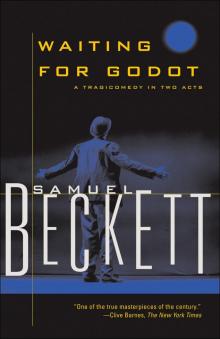 Waiting for Godot
Waiting for Godot Rockaby and Other Short Pieces
Rockaby and Other Short Pieces First Love and Other Shorts
First Love and Other Shorts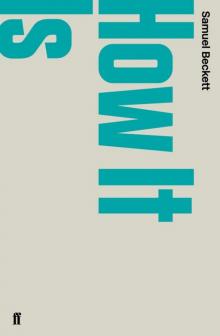 How It Is
How It Is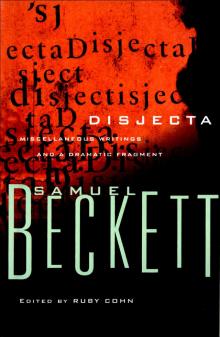 Disjecta: Miscellaneous Writings and a Dramatic Fragment
Disjecta: Miscellaneous Writings and a Dramatic Fragment Echo's Bones
Echo's Bones Texts for Nothing and Other Shorter Prose 1950-1976
Texts for Nothing and Other Shorter Prose 1950-1976 Three Novels
Three Novels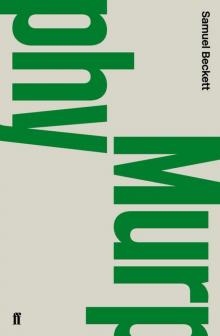 Murphy
Murphy Mercier and Camier
Mercier and Camier Eleuthéria
Eleuthéria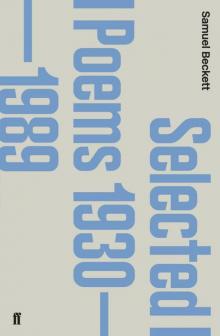 Selected Poems 1930-1988
Selected Poems 1930-1988 Dream of Fair to Middling Women
Dream of Fair to Middling Women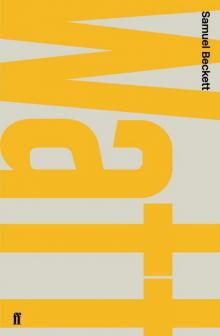 Watt
Watt Krapp's Last Tape and Other Dramatic Pieces
Krapp's Last Tape and Other Dramatic Pieces The Complete Dramatic Works of Samuel Beckett
The Complete Dramatic Works of Samuel Beckett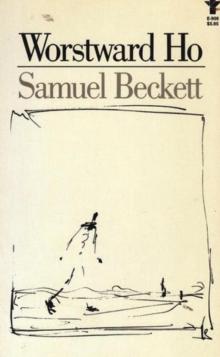 Worstward Ho
Worstward Ho Collected Poems in English and French
Collected Poems in English and French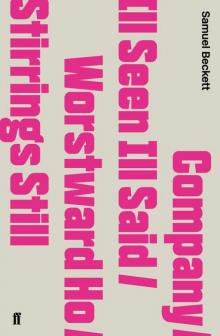 Company / Ill Seen Ill Said / Worstward Ho / Stirrings Still
Company / Ill Seen Ill Said / Worstward Ho / Stirrings Still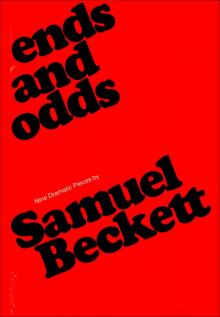 Ends and Odds
Ends and Odds Endgame Act Without Words I
Endgame Act Without Words I Rockabye and Other Short Pieces
Rockabye and Other Short Pieces The Collected Shorter Plays
The Collected Shorter Plays The Complete Dramatic Works
The Complete Dramatic Works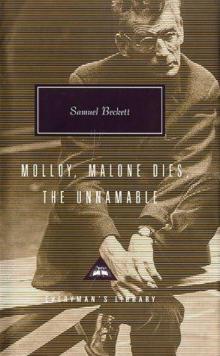 Three Novels: Malloy, Malone Dies, The Unnamable
Three Novels: Malloy, Malone Dies, The Unnamable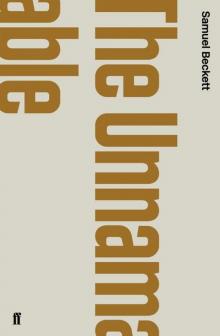 The Unnamable
The Unnamable